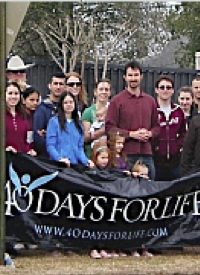
The eighth annual “40 Days for Life” campaign to end abortion launches September 28 at an unprecedented 301 locations worldwide. Local volunteers are set to begin constant 24-hour prayer vigils outside abortion clinics in their respective cities from September 28 until November 6. Participants have also pledged to fast and pray privately during the crusade and to take part in community outreach programs as well.
The campaign website explains 40 Days for Life “takes a determined, peaceful approach to showing local communities the consequences of abortion in their own neighborhoods, for their own friends and families.” Forty-eight new locations have been added to this year’s international event, including cities in Argentina, Puerto Rico, and Germany.
Campaign organizers boast phenomenal success in the past, and they have high hopes for this year’s substantially larger crusade. Campaign director Shawn Carney observed, “I often go back to those wonderful numbers — 4,313 lives saved from abortion, 53 clinic workers who’ve left the abortion industry, and 16 abortion centers that have gone out of business after 40 Days for Life’s peaceful prayer vigils were held in the public right-of-way outside their doors.” He anticipates tens of thousands will participate this year.
Volunteer Jennifer Fulwiler believes being a part of 40 Days for Life is one of the most important things she has ever done. She wrote of her past experience in the National Catholic Register: “There is hardly a better example of the power of prayer than the 40 Days of Life Campaign.” Fulwiler recommends it to others as “powerful” and “eye-opening.” Though she was wary as a newcomer to the pro-life movement, event organizers made sure she was well-prepared. She expected to find herself among extremists but was delightfully surprised that all her fellow volunteers were “average people” who care just as much about the mothers contemplating abortion as they do about the babies. Community reaction impressed her, too. “Overall, we got more positive responses than negative,” she said.
The 40 Days for Life campaign was born in 2004 in Bryan, Texas — the same place where, five years later, then-Planned Parenthood clinic director Abby Johnson witnessed an ultrasound of a baby being aborted in her medical center. She says the experience was a “spiritual conversion” and she immediately quit her job. She is now with the pro-life organization Live Action.
Another former Planned Parenthood clinic manager from the Dallas area credits 40 Days for Life with her conversion. Ramona Trevino told LifeSiteNews she finally realized Planned Parenthood “treated women like cattle” and “only cared about making money.” Four months later, the clinic she left in Sherman, Texas, closed its doors after Governor Rick Perry signed a bill stripping state funding from organizations that provide abortions.
Despite its peaceful approach to ending abortion, 40 Days for Life is one of the groups highlighted in the resource guide Violence Against Reproductive Health Care Providers published by Planned Parenthood, the National Abortion Federation, and the Feminist Majority Foundation. The U.S. Department of Justice (DOJ) distributes this 84-page document as part of its National Task Force on Violence Against Health Care Providers. The Department of Justice and the FBI joined these pro-abortion groups last year to sponsor a training program in Portland, Oregon. The New American reported that pro-life leaders are extremely disturbed by such partnerships, especially when they dub groups such as 40 Days for Life as terrorists and lump them together with violent offenders. One lawyer noted that it “indicates the FBI and DOJ are working hand-in-hand with the pro-abortion lobby to squash the constitutionally-guaranteed right to peaceful political dissent.”
The video below is one of several found at the 40 Days for Life website, explaining the group’s mission:




